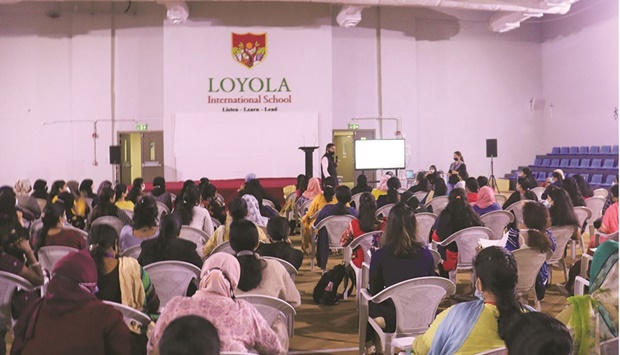* Loyola school holds teachers' training on Flipped Classroom and Ipsative Assessment
A seminar was held recently at Loyola International School on Flipped Classroom and Ipsative Assessment.
"The education system of the 21st century has changed radically. Creativity and innovation are speedily becoming key requirements for success personally and professionally. It is believed that, if children are leaving school without having this innovative capacity and not knowing how to be creative, they are at risk of being unprepared for the challenges that the digital era brings. In a constantly changing world, students need the ability to think critically and solve any problem which may occur in their lives," the school said in a statement. "Keeping in mind all these crucial aspects, Loyola International School arranged a seminar to improve teachers’ performance in the classroom environment."
The seminar was chaired by Loyola International School principal Pramod Kumar Ranwaka and academic co-ordinators from both branches, Oasis and Al Nasr.
Many teachers presented their ideas about the Flipped Classroom and Ipsative Assessment. All teachers were enriched with ideas about the two topics, which will help them create an effective learning environment, improve teaching-learning situations and inspire them to become creative and effective teachers in the modern world.
Veena Vijayan (Mathematics teacher) noted that Flipped Classroom is an escape from a traditional set of classes where students acquire foundational knowledge through self-study at home before classroom discussion. This Flipped Classroom system is highly beneficial for both online and on-campus students.
Sheba Angela (ICT teacher) shared her valuable knowledge that Flipped Classroom provides sufficient time and space for students to explore and experiment and develop comprehensive knowledge on a given topic.
Mohona Priya (teacher of English language) emphasised the importance of Ipsative Assessment in school where learners compare their current performances with the past performances and thereby get to know the weaknesses, which they need to work on. Ipsative Assessment helps learners self-assess and by the assessment, they become more self-reliant.
She also noted that this builds the self-esteem quality in a student.
A number of important aspects were discussed by other teachers at the seminar, related to the agenda topics. The seminar ended with the thoughts of the principal, who focused on the implementation of the above-mentioned systems in the Loyola family. He said, “Loyola believes in educating the whole child. It’s incredibly important to acknowledge each student as an individual and to have a full understanding of their strength and areas requiring improvement."
"The education system of the 21st century has changed radically. Creativity and innovation are speedily becoming key requirements for success personally and professionally. It is believed that, if children are leaving school without having this innovative capacity and not knowing how to be creative, they are at risk of being unprepared for the challenges that the digital era brings. In a constantly changing world, students need the ability to think critically and solve any problem which may occur in their lives," the school said in a statement. "Keeping in mind all these crucial aspects, Loyola International School arranged a seminar to improve teachers’ performance in the classroom environment."
The seminar was chaired by Loyola International School principal Pramod Kumar Ranwaka and academic co-ordinators from both branches, Oasis and Al Nasr.
Many teachers presented their ideas about the Flipped Classroom and Ipsative Assessment. All teachers were enriched with ideas about the two topics, which will help them create an effective learning environment, improve teaching-learning situations and inspire them to become creative and effective teachers in the modern world.
Veena Vijayan (Mathematics teacher) noted that Flipped Classroom is an escape from a traditional set of classes where students acquire foundational knowledge through self-study at home before classroom discussion. This Flipped Classroom system is highly beneficial for both online and on-campus students.
Sheba Angela (ICT teacher) shared her valuable knowledge that Flipped Classroom provides sufficient time and space for students to explore and experiment and develop comprehensive knowledge on a given topic.
Mohona Priya (teacher of English language) emphasised the importance of Ipsative Assessment in school where learners compare their current performances with the past performances and thereby get to know the weaknesses, which they need to work on. Ipsative Assessment helps learners self-assess and by the assessment, they become more self-reliant.
She also noted that this builds the self-esteem quality in a student.
A number of important aspects were discussed by other teachers at the seminar, related to the agenda topics. The seminar ended with the thoughts of the principal, who focused on the implementation of the above-mentioned systems in the Loyola family. He said, “Loyola believes in educating the whole child. It’s incredibly important to acknowledge each student as an individual and to have a full understanding of their strength and areas requiring improvement."

